Sport’s Greatest Underdog Stories

Rhys Wallis looks back at times in sporting history when the underdog came out on top.
Everyone loves an underdog story – unless your team is the one on the other end of the result of course – but what have been some of the best, most memorable underdog stories in sporting history? The magic of the FA Cup, the glittering heights of the Superbowl, the crash bang wallop of International Cricket – nowhere is safe from the plucky outsider turning the tables on the odds on favourite.
Leicester City: 2015/16 Premier League Champions
As an Englishman who likes his football, it is near impossible for me to go through a list of sporting underdog stories without mentioning the Leicester City title winning team of 2015/16. 5000/1 outsiders at the start of the season, Leicester – who had been battling relegation at the back end of the previous season – ended up sitting pretty atop the Premier League, leaving fans jubilant, and pundits – happily – bemused. Gary Lineker, longtime Leicester fan, former Leicester player and host of Match of the Day, was so confident Leicester would not be crowned champions that he lost a bet on air, ending up presenting the first show of the following season in a pair of Leicester-emblazoned boxer shorts.
2004 Euros
But enough about a very high profile underdog story – how about one from a bit further back? Sticking with football, the 2004 European Championships provided 2 remarkable underdog stories. The eventual champions – Greece – were favourites in the eyes of absolutely no-one. At the tournament, they were essentially meant to be one of the many also-rans, a team who would fill up one of the groups, and have a good time trying to be David against the Goliaths of France, Germany, and home-favourites Portugal. And yet, a team which hadn’t qualified for the Euros for 24 years, Greece found themselves lifting the trophy for the first, and so far only, time.
The other plucky underdog of the ’04 Tournament, and a criminally underrated one at that, was Latvia. Latvia – as a nation independent of the USSR – had never, and – at time of writing – has never again, qualified for the European Championships. Even as a constituent state of the USSR, no player of Latvian origin had ever gone to the European Championships. This minnow was ranked 52nd in the FIFA World Rankings and 32nd in the UEFA coefficient before the tournament, and yet qualified as one of the 16 teams headed to Portugal. Latvia was given no chance and, despite going out of the competition at the group stage, they managed to take points off Germany, ruining their tournament and helping to dump the three-time World Champions out of the Euros at the Group Stage. Latvia may never make it to another major tournament, but even if they do, the memories of 2004 will be strong, and for good reason.
Whilst Football is ripe for the underdog story – especially the Euros it would seem, with Denmark (a team which didn’t even qualify for the 1992 Championship, instead entering the tournament via a technical loophole after Yugoslavia dissolved and could no longer field a team) winning the ’92 edition of the Tournament, it does not hold a monopoly on underdog victories.
Boris Becker

Wimbledon – the jewel in the crown of the grass court season, and perhaps in the ATP Tour – has seen its fair share of underdogs. Goran Ivanisevic defeating Pat Rafter in the 2001 Final, becoming the first Wild Card entry to win a Grand Slam (ranked 125th in the World at the time) is a notable victory, and in a fantastic year to boot. But the one that stands above all is a plucky 17 year old, unseeded and unfavoured who would take the crown in 1985: Boris Becker. Becker had only turned professional in 1984 and managed to rout his competition and, despite a weakened draw due to the efforts of the player he would eventually face in the final – South African 8th Seed Kevin Curran – he would start a run at Wimbledon which would see him win consecutive Championships and 15 matches in a row on the Wimbledon Grass. Becker made history as the first unseeded Wimbledon Champion, and no one expected that.
The Ashes
Going back centuries, English Sport has always been good value for money if you’re looking for upsets – and not always on the victorious side. Cricket – not always touted as the most thrilling sport, but a favourite of mine – provided the most widely referenced underdog upset. In 1882, the unfancied Australians managed a 7 run victory over England, leading Charlie Alcock and Reginald Brooks (in separate articles) to proclaim the death of Cricket, with ‘The Body [to] be cremated and the ashes taken to Australia’, to quote Brooks in the Sporting Times. The episode earned the Test series its name: ‘The Ashes’. Australia aren’t exactly the underdogs any more, but the original dark horse victory has left its mark on the Cricketing Calendar.
Ice Hockey: 1980 Winter Olympics
For the penultimate underdog story, it’s a look at what has been dubbed the ‘Miracle on Ice’. 1980; The Amalie Arena, Lake Placid, New York State; The Hosts, America vs The Four-Time, Defending Gold Medallists of the USSR. There could only be one winner – right? The first period of play went roughly according to the script, the USSR took an early lead, a longshot against the run of play equalised for the USA, and then the Soviets scored their second of the match. With five seconds left in the period, the USA stuck a shot towards the Soviet goal, which was spilled, before being tucked into the net with one second on the clock.

Dr. John Kelley via Wikimedia Commons
The Second Period started with a shock – Tretiak (the USSR Goaltender) who had spilled the chance leading to the second USA Equaliser, was off the pitch, replaced by Vladimir Myushkin. Not to foreshadow the result too much, but the USSR’s coach would later call this the ‘biggest mistake of my career’. Apart from that, the USSR maintained their dominance of the match in this period, and scored – but only once from 12 attempts on goal. Even still, the 3-2 lead for the USSR after 2 periods – and with one to go – meant that the script was still being followed: the Third Period would rip that script up completely.
After a Soviet skater was sent to the penalty box, the US had a one man advantage (or power play) which changed the momentum in the match. Shots peppered Myushkin’s goal, but he was equal to them until, late in the power play, the puck slid under the goalie to tie the game at 3-3, with 12 minutes to go. Back to even players on both sides, the US continued to press until – with exactly 10 minutes left on the clock – the unthinkable: 4-3 to the USA. Ten minutes of Soviet assault on the American Goal then ensued, but it would be for nought, leading to the immortal words: ‘Five seconds left in the game. Do you believe in miracles? YES!!’ from commentator Al Michaels. The miracle on ice was complete.
1960 World Series: Pittsburgh
And yet that hasn’t got the honour of rounding off my favourite sports underdog story – that accolade goes to my favourite of US Sports: baseball. October 13th, 1960; The World Series; Game 7 of 7. The New York Yankees have won 8 out of the last 12 World Series. In the 1960 World Series, the Yankees had outscored the Pirates 55-27 in Runs, but – crucially – the games had fallen evenly between the two teams. The decider was to be held at Forbes Field, Pittsburgh – and what a game. Pittsburgh took an early lead, scoring 4 runs across the first 2 innings to the Yankees’ zero. The Bronx favourites however fought back and by the end of the 7th, the game had turned – 5-4 Yankees. In the top of the 8th innings, the Yankees made it 7-4, but the Pirates would go in to score 5 runs in the bottom of that innings: 9-7 Pirates, each team has one innings left to score runs.

The Yankees were desperate, they dug deep and tied the game at 9, but the Pirates still had one shot at scoring more runs before the extra innings – if they score a run, they win the game and the world series for the 3rd time in their history. Cue the greatest walk off home run in the history of baseball by Bill Mazeroski, sending the baseball high into the left field and over the wall, and sending the home fans into jubilant celebrations.
So that’s my take on the greatest underdog victories in sports – quite a list, and yet there are still so many I’ve left out, or left to a footnote in another section. And that’s what makes sports great: with the right circumstances, anyone can win – and I can’t wait for the next great underdog story to come around.


